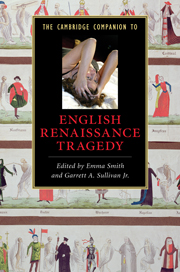Book contents
- Frontmatter
- Part 1 Themes
- Part II Readings
- 11 The Spanish Tragedy and metatheatre
- 12 Doctor Faustus: dramaturgy and disturbance
- 13 Edward II: Marlowe, tragedy and the sublime
- 14 Arden of Faversham: tragic action at a distance
- 15 The Revenger’s Tragedy: Original Sin and the allures of vengeance
- 16 The Tragedy of Mariam: political legitimacy and maternal authority
- 17 The Changeling and the dynamics of ugliness
- 18 The Duchess of Malfi: tragedy and gender
- 19 ’Tis Pity She’s a Whore: the play of intertextuality
- Index
16 - The Tragedy of Mariam: political legitimacy and maternal authority
from Part II - Readings
Published online by Cambridge University Press: 28 November 2010
- Frontmatter
- Part 1 Themes
- Part II Readings
- 11 The Spanish Tragedy and metatheatre
- 12 Doctor Faustus: dramaturgy and disturbance
- 13 Edward II: Marlowe, tragedy and the sublime
- 14 Arden of Faversham: tragic action at a distance
- 15 The Revenger’s Tragedy: Original Sin and the allures of vengeance
- 16 The Tragedy of Mariam: political legitimacy and maternal authority
- 17 The Changeling and the dynamics of ugliness
- 18 The Duchess of Malfi: tragedy and gender
- 19 ’Tis Pity She’s a Whore: the play of intertextuality
- Index
Summary
Elizabeth Cary's closet drama The Tragedy of Mariam (1613) presents the following challenge: what would happen in a specified culture if the central male authority figure - father and husband as well as king - disappeared for good? How would the vacuum be filled? The question is aimed at a culture in which domestic and political domains are inextricably intertwined: a patriarchal culture, that is, like that of early modern England. With this obvious referent, the dramatised culture in the play is ancient Palestine dominated by Rome. Cary conflates several episodes from Josephus's Antiquities to focus on a moment when King Herod has gone to Egypt to negotiate his position with Augustus Caesar after the fall of his patron, Mark Antony. Word reaches the court in Palestine that the tyrant Herod, who has usurped the throne from his wife Mariam's family, is dead. This news is greeted as welcome; it liberates repressed desires and ignites multiple plots among the survivors whose lives the tyrant had confounded and controlled.
News of the dead father-king generates the vibrant, unruly energies that comprise the action; but thanks to ample prefatory materials, the audience, knowing Herod is still alive, occupies a position similar to Revenge in Kyd's The Spanish Tragedy: watching the characters operate in manic delusion, only vaguely aware of their imminent doom. In Cary's play that doom comes for most protagonists with the king's reappearance at the start of the fourth act. Notably, the remoteness of the drama in time, space and ethnicity, along with Cary's representation of the action as no more than a hypothesis, fail to soften the ultimate blow.
- Type
- Chapter
- Information
- The Cambridge Companion to English Renaissance Tragedy , pp. 211 - 221Publisher: Cambridge University PressPrint publication year: 2010

